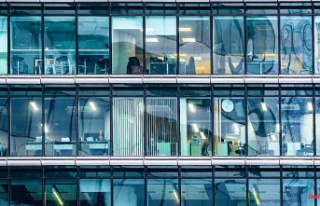Will Franco-German friendship break up over the issue of European energy policy? French President Macron at least warned at the EU summit that Germany's neighbors should not "isolate". The relationship between malice and envy is not only characterized by energy.
It would have been a pretty setting, the Castle of Fontainebleau with its beautiful park in autumn colours: but it was canceled a week before the planned meeting of the German and French government members near Paris - and the day before the EU summit. Both sides surprisingly openly admitted that the postponement of the Franco-German Council of Ministers also had to do with differences in content.
"It is always my wish to preserve European unity, as well as the friendship and alliance between Germany and France," stressed Macron in Brussels. He met Chancellor Olaf Scholz half an hour before the start of the EU summit. He then announced that it would be "not good for Europe" for Germany to "isolate".
Chancellor Olaf Scholz again defended the German position against criticism. "It is very clear that Germany acted in a spirit of solidarity," said the Chancellor. The federal government is relieving the burden on the citizens, he said, referring to the German "defense shield" of up to 200 billion euros. It is "exactly what France is doing, Italy is doing, what Spain is doing and many other countries are doing," emphasized Scholz.
At the same time, he again rejected a European gas price cap. The EU must agree on concepts that also work, said Scholz. "No one wants to make decisions that are theoretically good afterwards, but there is no gas," emphasized the Chancellor. Scholz, on the other hand, was open to joint gas purchases by the member states. The Chancellor said it was important for the EU to coordinate its strategies on how gas storage facilities will be filled in the coming year. "This is important so that prices do not rise," he emphasized.
The short-notice cancellation of the ministerial meeting in Fontainebleau on Wednesday was an admission that Franco-German relations have hit rock bottom. "The fact that Germany and France are not coming together in these critical times is worrying for the whole EU," says Marc Berthold, head of the Heinrich Böll Foundation in Paris. "This is exactly the scenario that Vladimir Putin wants," commented the French newspaper Les Echos. It would suit Russia if the Europeans were at odds with each other.
The list of Franco-German issues is long - and contains enough fuel to affect the entire EU. During the energy crisis, France accuses Germany of using its economic power to distort competition at EU level. At the EU summit this Thursday and tomorrow, Friday in Brussels, joint gas purchases are therefore also at stake.
Even though both sides have agreed to help each other out with electricity and gas next winter, there is a certain sneer at each other's energy policies. From a German point of view, France is paying the price for having relied too much on nuclear power and now numerous reactors are shut down at the same time. France, on the other hand, accuses Germany of having relied on cheap Russian gas for too long and now having to run coal-fired power plants, which emits too much carbon dioxide (CO2).
There is also disagreement over the construction of a pipeline from Spain to France. As a result, gas and later also hydrogen could flow to France - and from there on to Germany. The project was stopped in 2019 due to a lack of profitability and environmental concerns.
France has little interest in Germany getting gas or hydrogen from Spain, as it could supply both itself. Federal Economics Minister Robert Habeck, however, reaffirmed Germany's interest in building the line and called it a "project for the future".
There are also controversial points in defense. France had long accused Germany of spending too little money. Since Germany massively increased its defense budget, France has watched in horror as Germany buys US fighter jets and organizes military ring swaps with Eastern European countries. This is primarily about support for Ukraine, but ultimately also about sales markets for the country's own armaments industry.
The joint development of the FCAS combat aircraft system has already been delayed due to industrial rivalries. The French company Dassault does not want to be seen in the cards, the German-based armaments division of Airbus does not want to be satisfied with the role as a supplier. France also does not want to have any export rules dictated.
From the French point of view, the most recent affront was Scholz's proposal to set up a European air defense system. 15 countries now want to take part, but not France, which is developing a solution with Italy.
"A lot, a lot of china has been smashed," says the chairman of the EPP group in the European Parliament, Manfred Weber. Germany is perceived as a blockade country. "There have always been times when the relationship was strained, but now it's worse," says Jacques-Pierre Gougeon of think tank IRIS. "We have to go beyond the symbolic," he says, referring to the Franco-German Council of Ministers. It is more important that the ministries of both countries work out compromises.












